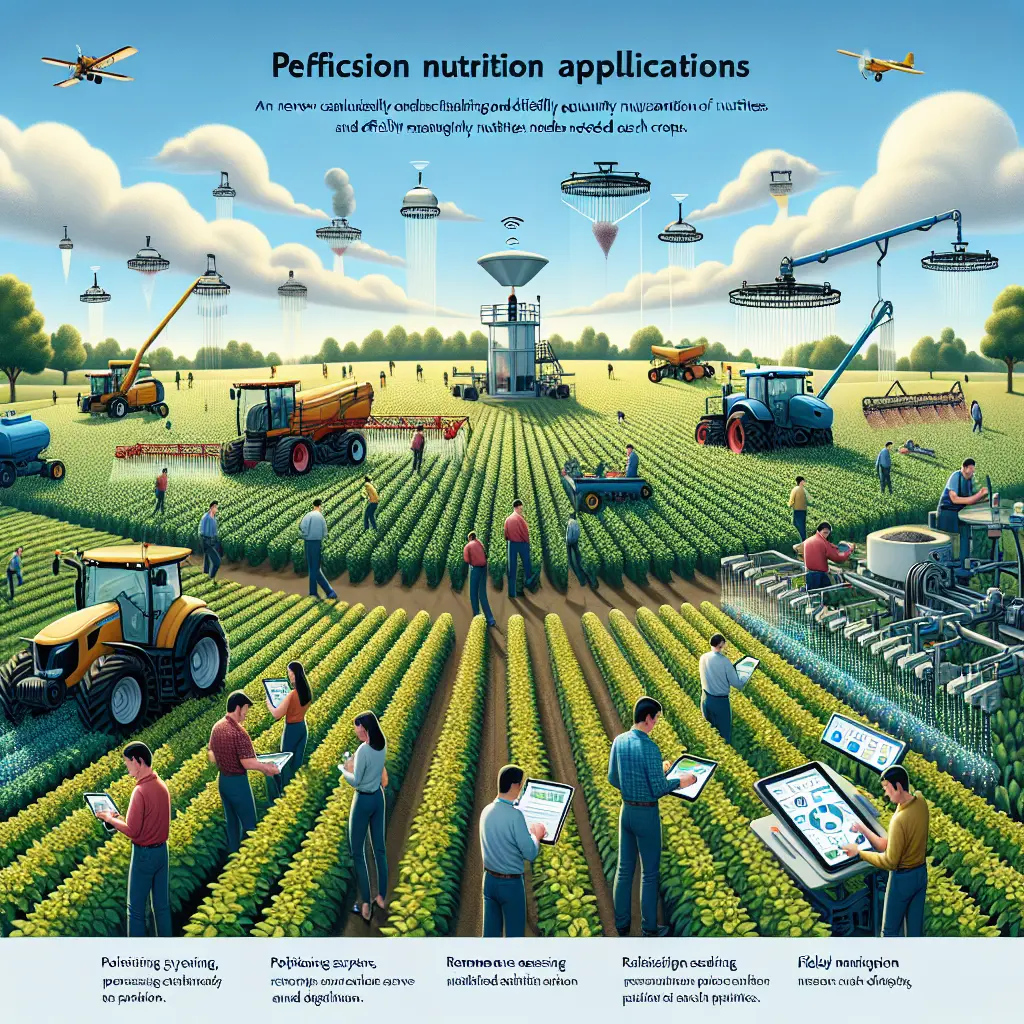
Exploring Precision Agriculture for Enhanced Nutrient Management
In an era where sustainable agriculture and efficient farming are crucial, precision agriculture stands as a beacon of innovation, redefining how we approach nutrient management. By leveraging smart farming technology and data-driven agriculture, precision nutrient application has become a reality, offering the promise of improved soil health management and crop nutrient optimization.
The Role of Precision Farming Tools
Precision farming tools, such as agricultural drones and GPS farming systems, empower farmers to implement site-specific crop management. These advancements utilize remote sensing in agriculture to gather detailed data, enabling precision irrigation and variable rate technology to fine-tune the distribution of nutrients. This ensures every plant receives exactly what it needs, minimizing waste and promoting sustainable nutrient practices.
Integrating Technology with Agriculture
The integration of nutrient monitoring systems with yield mapping allows for a comprehensive soil nutrient analysis, providing insights that were once out of reach. This data-driven approach not only enhances efficiency but also supports sustainable agriculture by reducing the environmental impact of traditional farming methods. The result is a harmonious blend of increased productivity and ecological responsibility, with soil health and yield potential at the forefront.
AI and Technology Transforming Nutrient Management
The integration of AI into precision agriculture marks a transformative shift in how we manage and distribute nutrients. For instance, new spray application technology utilizes on-the-go imaging of plants coupled with artificial intelligence (AI) to optimize spraying parameters. This ensures precise coverage and efficient nutrient distribution, minimizing waste and enhancing crop yields. The advent of AI is quietly revolutionizing farmlands, merging modern technology with traditional farming techniques to foster sustainable agriculture.
Case Study: The Impact of Geospatial Data
Geospatial data has become an integral part of precision agriculture, offering significant benefits for efficient farming. It allows farmers to conduct comprehensive soil nutrient analysis and yield mapping, leading to informed decision-making regarding nutrient management. By incorporating nutrient monitoring systems, farmers can accurately track soil health and adjust their strategies accordingly, promoting sustainable agriculture practices.
Companies like Deere & Co are at the forefront of integrating advanced geospatial data into their precision farming tools. Their recent quarterly earnings report highlighted the effectiveness of such technologies in maintaining profitability despite market challenges.
Innovations in Sustainable Food Production
Beyond traditional farming practices, innovations like precision fermentation are revolutionizing how we produce food. This biotechnological process creates animal-free dairy products by using bacteria and yeasts, paving the way for sustainable alternatives. Such advancements highlight the broader implications of precision agriculture beyond mere nutrient management—opening doors to more sustainable food systems that align with global ecological goals.
Another pioneering venture involves producing food 'out of thin air.' In Helsinki, a factory is developing scalable proteins from fermented bacteria, showcasing how precision nutrient application can extend beyond crops to broader food production systems.
Regenerative Agriculture: A Complementary Approach
As precision agriculture gains momentum, regenerative agriculture presents a complementary approach that emphasizes ecosystem health and biodiversity. By integrating regenerative practices, farmers can enhance soil health management while optimizing crop nutrient use. This synergy between precision and regenerative agriculture promotes a holistic view of sustainable farming that prioritizes both productivity and ecological responsibility.
Addressing Global Challenges with Smart Farming Technology
Precision agriculture is not just about local benefits; it plays a crucial role in addressing global challenges like food security and climate change. Experts believe that AI-powered technologies can usher in an era of high-yield farming capable of feeding an ever-growing population while minimizing environmental degradation. By adopting smart farming technology, we can tackle hunger effectively and sustainably.
Real-World Applications: A Glimpse into Future Farms
Imagine a farm where every plant communicates its needs through sensors that relay information to farmers in real-time. This scenario is becoming a reality as precision nutrient application continues to advance. By leveraging data-driven agriculture, farmers can make informed decisions that enhance efficiency and productivity.
Furthermore, the collaboration between space technology and agriculture offers new frontiers for sustainable practices. The integration of satellite data into farming operations provides valuable insights into climate patterns and land use, supporting more informed nutrient management strategies.
Conclusion: Pioneering the Future of Agriculture
Precision agriculture has redefined nutrient management, blending cutting-edge technology with traditional farming to optimize soil health and crop yields. Key advancements in this field include:
- AI Integration: Revolutionizing nutrient distribution by optimizing spraying parameters.
- Geospatial Data Utilization: Supporting informed nutrient management decisions.
- Sustainable Food Production Innovations: Offering sustainable alternatives to traditional agriculture.
- Synergy with Regenerative Agriculture: Fostering ecosystem health and biodiversity.
- Global Impact on Food Security: Addressing global challenges like food security and climate change.
By leveraging these advancements, farmers can make informed decisions that increase efficiency and productivity while reducing environmental impact. As these technologies evolve, they promise to transform not just farming practices but the entire food production system.
As we stand at the forefront of this agricultural revolution, consider how you can incorporate these innovations into your own practices. Whether you're a farmer, researcher, or enthusiast, your engagement with precision agriculture can contribute to a more sustainable future. Share your experiences, insights, or thoughts on how these technologies have impacted your approach to farming. How are you preparing for the future of nutrient management?
Thank you for joining me on this exploration of precision agriculture. Together, let's cultivate a resilient and sustainable agricultural landscape for generations to come.
Author: Ethan Greenwood